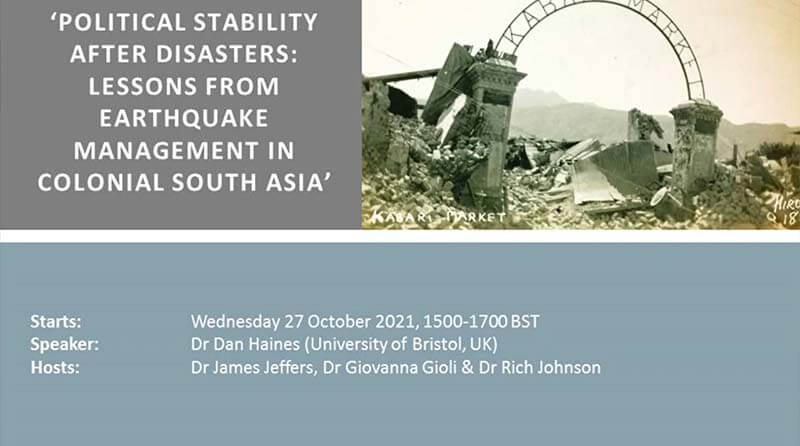Political stability after disasters
Event
Political stability after disasters: Lessons from earthquake management in colonial South Asia
Wednesday 27 October, 2021 – Wednesday 27 October, 20213:00 PM – 5:00 PM
Online
Part of the Hazard, Risk and Disaster (HRD) Research Lecture Series 2021-22.
Major earthquakes in India between the 1890s and 1930s coincided with immense political upheaval, as the nationalist movement grew from a small group of elite moderates to a mass public movement. ‘Natural’ disasters, especially famines, were an important part of nationalist critiques of colonial governance, but earthquakes prompted limited political mobilisation. Why? Dr Dan Haines argues that the colonial government successfully used a mix of material and discursive strategies to forestall political change by restoring the status quo ante, particularly by emphasising and rewarding collaboration with powerful South Asian social groups. At the same time, leading nationalists shared important assumptions, about earthquakes’ natural origins and the social role of the middle classes, with government officials which limited the scope for political fallout. The talk, which draws on archival research from India, Pakistan, Myanmar and the UK, will shed new light on the political dynamics of earthquake management in modern South Asia.
About the speaker
Dr Dan Haines is Associate Professor in Environmental History at the University of Bristol. He recently led a GCRF-funded project on historical earthquakes in South Asia, and has collaborated with environmental scientists, social scientists and policymakers on resilience-focused projects in the Himalaya. His earlier work focused on dam-building in Pakistan and India-Pakistan river water disputes. He is currently an AHRC Knowledge Exchange Fellow at the Foreign, Commonwealth and Development Office, but will be speaking in a personal capacity.
